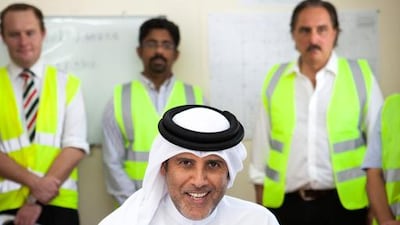It was not so long ago that even finding Alserkal Avenue was a challenge. Located among the homogeneous buildings of Dubai's industrial zone, the avenue, which consists of three connected passageways lined with voluminous warehouses, was difficult to find even for a regular visitor.
However, come the beginning of next year, the complex will double in size with an additional 76,200 square metres opening up.
At least, then, it will be much more difficult to miss.
In truth, the number of visitors locating and frequenting the area has increased dramatically over recent months and a rash of small businesses have sprung up nearby, creating more of a buzz across the whole neighbourhood.
Although the first galleries in Alserkal Avenue opened their doors in late 2007, the economic crash of 2008 slowed down business and even after that, it took a while before the creative community became familiar with the destination.
But now, a steady stream of people wind their way around the avenue and, according to the founder and developer, Abdelmonem bin Eisa Alserkal, demand to rent the space is higher than ever.
As well as doubling the number of warehouses, the new extension will also house food and beverage outlets, an events centre and a large car park, which is one of the more pressing needs as the number of visitors increases.
"We are trying to accommodate everyone," says Alserkal. "We want to have more space, more places to eat and drink and the necessary infrastructure. The idea is to make it a destination and to continue to be a place to serve the creative community."
If there is one thing that is clear when talking to Alserkal, it is his commitment to the artistic population of Dubai and the wider UAE. When the project began in 2007, it was his vision, he explains, to recreate the spirit of Shoreditch in London's East End or Manhattan's Meatpacking District in New York.
"These places are now very commercial but they were, at one time, the area for creative people to congregate," he says. "I had the same idea of making a hub for art galleries and other creative enterprises here in Dubai."
One of the first galleries to set up shop in Alserkal Avenue was Ayyam, the gallery owned by the Syrian cousins Khaled and Hisham Samawi, which now has six branches worldwide.
Carbon 12, known for its programme of institution-grade artists and Gallery Isabelle Van Den Eynde (Gallery IVDE), founded in 2006, were the other two there from the beginning.
It was as much thanks to the galleries for having faith in the location, as it was to the developers, that the initiative succeeded.
"I believed a place such as this would work but the galleries themselves also believed in the area, so the recognition for Alserkal Avenue today goes to them for being here from the start," says Alserkal.
Although the art scene at the time was not as mature as it is today, it slowly began to succeed, with real momentum picking up in 2010 and 2011, when a spate of galleries arrived. Notable among these was Salsali Private Museum (SPM), showing the private collection of Ramin Salsali, a prominent Iranian collector, and, a few months later, La Galerie Nationale, a French design gallery with a long history of success in Paris.
At the opening of the art season in late 2012, The Fridge, a performing arts organisation, providing a platform for regional musicians and performers, opened its doors. Also that year, Green Art Gallery and Gallery IVDE were the first Gulf galleries to ever participate in Art Basel in Switzerland.
"I am really proud of where we have reached," says Alserkal, who travels to the international art fairs to support the Alserkal Avenue galleries. "It gives me more encouragement to support."
Having been raised in a family of patrons of the arts meant that Alserkal never questioned his vision or his dedication to the galleries.
"It is part of the job, isn't it?" he says when asked why he has spent his personal time and money visiting Art Basel Hong Kong, Art Brussels and Frieze in London this year alone to support the galleries participating.
"My father enjoys traditional Islamic art and Arabesque designs and he has always been a patron by hosting artists and commissioning them for his building projects and so my relationship with the galleries in the Alserkal Avenue family comes naturally to me; we support each other," he says.
The fact that one family owns the entire complex also means Alserkal can guide the area to maintain its niche status. When the expansion opens next year, each of the institutions in the new warehouses will have already been vetted to make sure they are "adding value to the art scene". As such, we will not see any mainstream commercial entities swallowing up the spaces and it will retain its home-grown, entrepreneurial spirit.
Also, although its popularity is on the rise, Alserkal is determined to keep his personal connection with each institution.
"The whole art scene is developing and so it is natural that we should grow, but we will support everyone who comes and joins us; we are one big family."
• Find out more about Alserkal Avenue at www.alserkalavenue.ae
aseaman@thenational.ae

Abdelmonem bin Eisa Alserkal on the expansion of Dubai’s Alserkal Avenue
Alserkal Avenue, Dubai's cultural district in the industrial zone, will double in size by next year. We talk to the developer to find out more.
Most popular today
